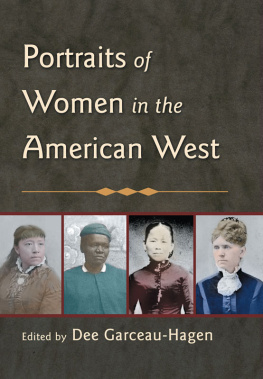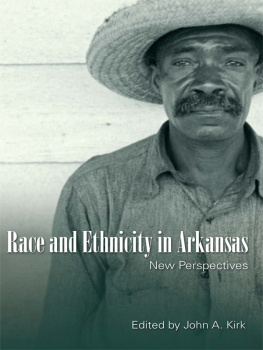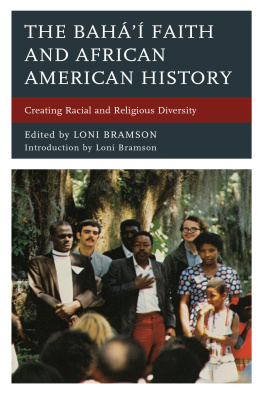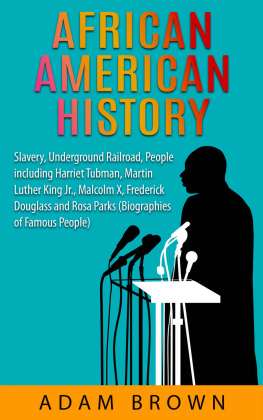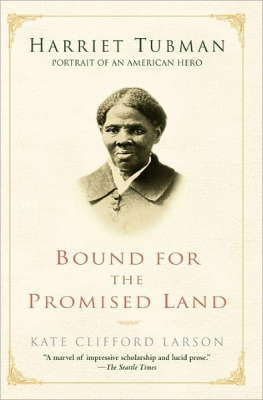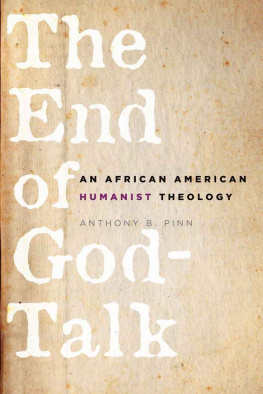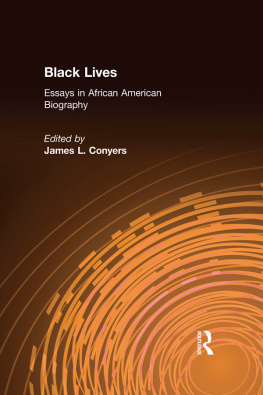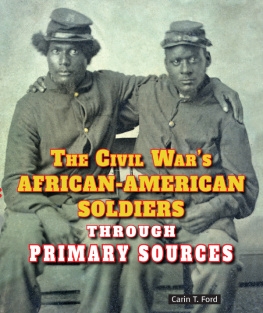Published in 1996 by
Routledge
711 Third Avenue,
New York, NY 10017
Published in Great Britain by
Routledge
2 Park Square, Milton Park,
Abingdon, Oxon OX14 4RN
Routledge is an imprint of the Taylor & Francis Group, an informa business
Copyright 1996 Routledge
All rights reserved. No part of this book may be printed or reproduced or utilized in any form or by any electronic, mechanical, or other means, now known or hereafter invented, including photocopying and recording, or in any information storage and retrieval system, without permission in writing from the publisher.
Library of Congress Cataloging-in-Publication Data
This far by faith : readings in African-American women's religious biography / edited by Judith Weisenfeld and Richard Newman.
p. cm.
ISBN 041591311-X. ISBN 0415913128 (pbk.)
1. Afro-AmericansReligion. 2. Afro-American womenBiography. 3. Religious biographyUnited States. 4. Women and religion
United StatesBiography. I. Weisenfeld, Judith. II. Newman,
Richard, 1930.
BR563.N4T463 1996
277.3'08'082dc20
9531000
CIP
ACKNOWLEDGMENTS
W e would like to thank Dr. Bettye Collier-Thomas of Temple University and Dr. Stephen Ward Angell of Florida A&M University for permission to include their previously unpublished articles in this collection. Thanks from Judith to Timea Szell, Celia Deutsch, Dick Newman, and Marlie Wasserman for their comments on the introduction. We are also grateful to our editor at Routledge, Marlie Wasserman, for the encouragement that moved this project from its planning stages to publication, to her assistant, Mary Carol DeZutter, for guidance in preparing the manuscript, and to our production editor, Kim Herald.
We have been believers yielding substance for the world.
With our hands have we fed a people and out of our strength have they wrung the necessities of a nation.
Our song has filled the twilight and our hope has heralded the dawn.
Margaret Walker, We Have Been Believers,
For My People 1942
T he religious lives of African-American women loom as a substantial and yet largely undiscovered terrain in the study of religion in America. Despite the relative lack of scholarly attention to African-American womens personal spiritual experiences and expressions, both womens communities of faith, as well as their religiously based impulses to effect social change have constituted the core of the personal histories of many women of color. Even a cursory examination of the range of African-American womens experiences across the lines of class, region, time, sexuality, and particular religious affiliation reveals a stunning range of spiritual expressions for women as varied as Aretha Franklin, Sojourner Truth, Marie Laveau, Maya Angelou, and Mary McLeod Bethune. While these and many other women do not measure the value, duration, or depth of their religious experience against a uniform standard, they nevertheless indicate the influence of religion on their lives in some way. As Margaret Walkers powerful poem, excerpted above, emphasizes, religious belief systems have assisted African-American women in centering themselves and their communities in times of hardship, and they have provided a language for expressing the joy and hope of better times.
This volume approaches the large question of the character and function of religious experience and expression for African-American women through the telling of individual religious life stories. The essays included here do not seek to idealize black womens religious lives, but, rather, they attempt to understand the complexities of religion in America from the range of perspectives afforded by African-American womens experiences. Some of the women who appear in this collection were connected to or emerged from many Protestant denominations, including the African Methodist Episcopal, African Methodist Episcopal Zion, Methodist Episcopal, Presbyterian, Pentecostal, and Baptist. Others were committed to Roman Catholicism, Mormonism, the African Universal Church, or African-derived traditions, and yet others with no particular affiliation still grounded their lives in spiritual concerns. Some of the women had important relationships with men, some had families, and many sacrificed a great deal for their spiritual convictions. All of these women, together and as unique individuals, whether famous, of enduring influence in American society, or lost to the historical record save for these essays, provide a singular perspective on American and African-American religiosity. Nevertheless, it would do them a disservice to view each woman outside the context of larger issues concerning African-American women and religion.

First, why have we separated out the particular case of African-American women for such a collection of essays? Central to our analysis of religion in America is an understanding of religious experience as embedded in social contexts. While the most intimate, direct, and personal religious experience can be examined productively as merely an individual event, no person fails to be influenced by the powerful social forces within which she finds herself. For African-American women, experiences and identitiesreligious and otherwisenecessarily emerge through their participation in a society built around particular constructions of race, gender, class, sexuality, and other such categories.1 To speak of the socially constructed nature of race, for example, is to view it not as a biological fact inhering in genetics, but, rather, as a lens through which people recognize difference, exercise power, and enact community boundaries. To recognize race, gender, class, and sexuality as socially constructed expressions of power does not, however, negate the reality of these categories as means both of disempowering people and also of constructing positive communal and individual identities. Additionally, we must see the interaction of all of these categories with one another in ways that make the experiences of African-American women different from those of other women and of men. In this way, a thorough, critical examination of the specificity of African-American womens experiences becomes of serious importance.


